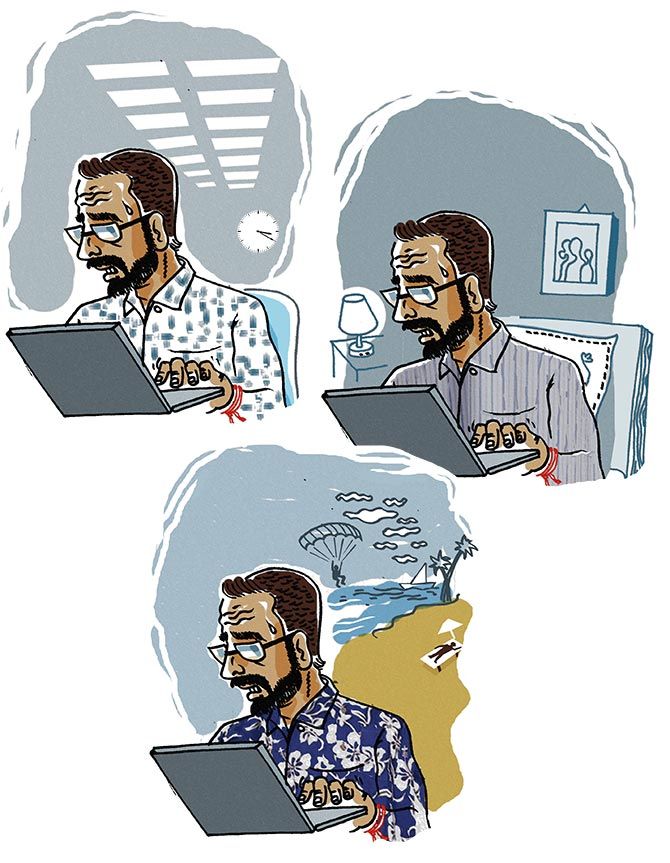To young professionals I would say, work hard, play hard and not be constrained by fads like WLB, says Sudhir Bisht.

The term work-life balance is tossed around frequently nowadays and I agree with the basic premise, that there is need for balance in most things in life.
I also agree that the personal time and private space of every employee need to be recognised and respected by organisations. However, the over-emphasis on work-life balance, especially by those super achievers who never practised such a thing, is what I find arcane.
While there are adequate safeguards against the exploitation of 'time resource' of blue-collared workforce under the various labour laws, no such provisions exist for white-collared men and women who are not classified as workers.
I have worked in companies in India and abroad, in some of the biggest companies that find a place on the Fortune list. I have also worked closely in the MSME sector in India in an advisory capacity.
My own view on work-life balance or WLB is that the time resource of the workforce is dictated by factors like the organisational culture of the company or the culture of the customer/client company. It also depends upon the competitiveness among employees and the wage mechanism.
An hourly wage may push employees to work long hours and if the wages are linked to output, the employee may be driven to work long hours to fulfil his/her own need for higher paycheck. This is most common across the production and sales departments of many companies.
More revenues you generate, higher goes your variable pay. Ditto for the number of units you produce or systems you repair or the boxes you pack or the parcels your deliver.
Is it even relevant to talk about WLB in such situations?
WLB may also depend upon the organisational culture of the company, which in turn may be influenced by the culture of the society, state or the country. I would cite an instance of a telecom OEM company that was headquartered in France and followed a strict rule of no-work-on-weekends. However, this was not acceptable to its client, a telecom operator in Africa, deeply rooted in the entrepreneurial culture of 24x7 work.
Until the French company enjoyed monopoly in the market, the client company bore with it silently. The OEM company provided the telecom equipment and had a very profitable service contract with the telecom operator.
The equipment was great and the service was good, but the OEM company was never willing to take calls on Sundays. No meetings on Saturday or Sundays with the top management of the client. Even breakdown services on Sundays came at a premium charge. This was simply not acceptable to the client but since no alternative was available, the client suffered in silence.
However, the day Chinese companies entered the market, the French OEM was promptly replaced. I had an opportunity to interact with the African entrepreneur and he explained to me that he was very unhappy with the French OEM's refusal to work on weekends. This "relaxed working style" was not able to meet his own punishing schedule of project commissioning and this was rubbing on to his African employees as well, the client complained.
WLB can also be in jeopardy for those working in one of the essential services of the economy. Can there be WLB in the Delhi police that is so understaffed?
During my stint in one of the biggest public sector undertakings in India, the workers were paid double the wages for every hour of work over and above 48 hours of weekly work, but the officers were paid no overtime.
The LPG bottling plant where I worked was short on officers and there were a number of occasions when as a young officer, I had no option but to work on some Sundays simply because of this shortage.
I, my colleagues and even our plant manager spent more than 10 hours a day from Monday to Saturday to meet the bottling targets. There is no way we could have avoided working all those extra hours.
Our country needed us to work harder and harder. The demand for LPG in the late 1980s and early 1990s was rising like a rocket. Work-life balance, what was that?
Work-life balance is an issue of applied ethics and there is a normative/prescriptive point of view attached to it. Prescriptive ethics is concerned with what is right or wrong and it deals with the question that how should people act? What is the correct course of action?
At the same time, we need to understand the issue of WLB from the point of view of descriptive ethics. It deals with the question, what do people think is right?
Between the perspective ethics and descriptive ethics there is a wide gulf. While work-life balance is what I want for myself, do I want the WLB concept to apply to my house help who works almost 30 days a month, washing dishes and mopping the floor at my home?
An employee of a big company seeks less and less working hours and more leisure time from her/his company and s/he wants full control over her/his four weeks of annual holidays. However, is the same employee willing to extend the same benefits to the servant boy who works in her/his house the whole day and sleeps in the tiny 12ftx12ft room next to her/his garage?
If we demand work-life balance from our employers, then should we not extend that philosophy to the people who work for us?
How much more hypocritical can we get if we fight our boss for denying us leave to chill out in Goa, but we dismiss the plea of our driver who wants to visit his family residing in faraway village, during Diwali?
So does this beast called work-life balance exist or it is a product of utopian delusion? My stream of consciousness makes me deduce as under:
There is little WLB in USA, China and India. It is much talked about in companies that have headquarters in France or the Norwegian region, but the companies that dominate the world trade belong to USA and China.
An average worker in China works 10 hours in the factory and eats at least two meals in the canteen. S/he spends her/his night in the modest living apartment provided by her/his factory, within walking distance of her/his workplace.
The workers of the USA are paid an hourly wage and the professors at American universities may talk about WLB, but the janitors who work in these universities are forced to indulge in moonlighting to be able to eke out a living. A few American companies may still appear to be fans of WLB, but they may be faking it.
Companies have no real power to ensure WLB. Employees' work-life is dictated by clients and influenced by the competitors. No management can afford to practice WLB if the market share keeps getting squeezed or if the customers are angry over delayed deadlines.
Competition among people within the organisation is a huge barrier to WLB. Everyone wants to go up the ladder. Even in the most professional companies whose HR swears by WLB, the employees do exactly the opposite.
As the work pressure piles up, the employee who is willing to forgo her/his annual vacation to meet the client's deadline is often rewarded. Who want to lose out in life anyways?
Enhancement in lifestyles has led to the need for greater paychecks. Thirty years ago, the middle class was saving to buy a flat, afford a small car and send kids to college. The young professionals today have different goals. They want to save for that trek across the Grand Canyon, to buy that fully loaded SUV and to be able to send the kid to Singapore or Australia for an undergraduate course.
With ambitions like that, WLB can wait for post-retirement.
Many professionals work their backside off because they simply have no clue about what exists outside their professional workspace. They never read a novel, never enjoyed the OTT stuff, never went picnicking and never played a racquet sport in their lives.
These people often end up working on their office projects all the time. They are seen checking emails over a glass of beer at the bar and sending out reports at midnight from their beds.
WLB is too illusory and most people who talk about it are the ones who have worked twice as hard as their average colleague has. They may talk about work-life balance in seminars because it appears to be the in-thing but inver practise it.
Do I leave without giving a piece of advice, then? That would not be fair on my part. To young professionals I would say, work hard, play hard and not be constrained by fads like WLB.
Develop moral strength and try to go into some kind of spiritual learning early in life. This will help you answer the questions yourself.
Do not shun work for the sake of WLB.
Yet if Work-Life-Balance is your sole aim in life, be prepared for an average career, which by the way is NO shame.
Dr Sudhir Bisht, author and columnist, writes from New Delhi.










